Consecutive Interpretation
In Consecutive Interpretation he interpreter listens to the source language of one or multiple speakers and, after a sentence or a part of the speech, reproduces the speech in the target language for the audience. Usually, the interpreter summarizes the original sentences or relays the gist. Consecutive Interpretation is more useful for one-to-one meetings and small groups.
Often Consecutive Interpretation interpreter are incorrectly labelled as 'Consecutive translation' and as 'Consecutive translator', not differentiating the definite distinction between interpretation and translation.
For third party information, please check out: Wikipedia
Consecutive Interpretation
Consecutive Language interpretation is the facilitating of oral or sign-language communication, either simultaneously or consecutively, between users of different languages. The process is described by both the words interpreting and interpretation.
In professional parlance, consecutive interpreting denotes the facilitating of communication from one language form into its equivalent, or approximate equivalent, in another language form; while interpretation denotes the actual product of this work, that is, the message thus rendered into speech, sign language, writing, non-manual signals, or another language form. This important distinction is observed to avoid confusion.
A Consecutive Interpreter is a person who converts a thought or expression in a source language into an expression with a comparable meaning in a target language in "real-time". The Consecutive Interpreter's function is to convey every semantic element (tone and register) and every intention and feeling of the message that the source-language speaker is directing to target-language recipients.
Know everything you need to know about consecutive interpretation in our blog ‘What is Consecutive Interpretation?’
Simultaneous vs Consecutive Interpretation
Simultaneous Interpretation is distinctly different from Consecutive Interpretation. In Consecutive Interpreting, in which the speaker stops usually at the end of every “paragraph” or complete thought, for the interpreter to step in to render what was said into the target language. In Simultaneous Interpretation, there are no such breaks. A key skill involved in consecutive interpreting is note-taking since few people can memorize a full paragraph in one hearing without loss of detail. The interpreter’s notes are very different from those of, say, a stenographer, because writing down words in the source language makes the interpreter’s job harder when he has to translate the speech into the target language.

Full Infographic on slideshare: Globibo ISO 18841 Interpretation Standard Infographic
Consecutive Interpretation Systems
Compared to Simultaneous interpretation, Consecutive Interpretation usually requires only a significantly more simple technical setup. Globibo has a wide range of different Interpretation Systems to accommodate for different needs of Clients and Interpreters. The key components required for a Consecutive Interpretation System (also called Mobile Interpretation System) are:
- Tour Guide System Microphone : The get a crisp sound from the interpreter into the transmitter.
- Tour Guide System Transmitters : The mobile infrastructure to emit the interpretation signal to the receivers.
- Tour Guide System Headsets : The wireless device for delegates to hear the interpretation wherever they are in the facilities.
- Tour Guide System Charging Cases : To charge the headsets and transmitters for multi-day events
Several industry standards govern Mobile Interpretation Systems. We can also support large-scale events for professional Simultaneous Interpretation Equipment (like Mobile Booth). For more information on our Interpretation Equipment, please check out the following page: Interpretation Equipment
Consecutive Interpretation Standards
Quality standards for Language Interpretation are still rather new. Different associations have summarized different standards but new ISO standards are more and more taking over the international market. The general standard ISO 18841 is explained above. The international ISO standards are also linked to specific types of interpretation, eg Legal Interpreting (ISO 20228:2019). For more information on ISO 20228, please check out https://www.iso.org/standard/67327.html.
Several established Translation Standards support the terminology used and best practices applied in Interpreting.
- ISO 17100 / 11669 or regional and local standards,
- ISO 18841 describes basic principles, working conditions, and procedures as well as general qualification criteria for Interpretation Projects. The Interpretation Standards ISO 18841 is rather new. In several sections, ISO18841 relates to other standard government language services. For an infographic on ISO 18841, please check out: Globibo ISO 18841 Interpretation Standard Infographic
- Related standards like ISO 20108 and 20109 focus mainly on the technical equipment and ergonomics of the Consecutive Interpreter.
- ISO 4043 focuses exclusively on the mobile booth (a separate standard structure details for in-built booths).
Several associations also summarize best practices and code of ethics for Interpreters, but those guidelines often risk swinging more towards competition dilution than Customer Quality Assurance.
Language Interpreter Qualification
Consecutive Interpreters is a slightly less complicated approach compared to Simultaneous Interpretation. Even though, linguists require thorough qualifications and certifications to provide the right quality of service. Interpreters do not just need linguist talent, but also very specific training on technologies and technical equipment. Beyond the language combination and direction, special attention is given to the specific subject matter of the conference/meeting and the corresponding background of the consecutive linguist. Industry- and domain knowledge appear to be one of the key drivers of project excellence.
Based on international standards, guidelines for associations, and policies from different ministries, we have defined a qualification standard and process to select the right linguists for specific projects. With global delivery centers around the world, we have access to a larger pool of linguists and can select balancing talent and cost.
Related Language Interpretation Approaches
- Consecutive Interpretation: segment-based interpretation via summarizing / gisting 1-5 minutes of speech
- Simultaneous Interpretation: renders the message in target-language as quickly as he or she can formulate it from the source language, while the source-language speaker continuously speaks
- Liason Interpretation: used mainly to mediate between 2 or more people who do not speak the same language on a more informal and personal basis
- Whispered Interpretation: interpreter sits or stands next to the target-language audience whilst whispering a simultaneous interpretation of the message in question
Do you want to understand the difference between consecutive and simultaneous interpretations? Read our blog ‘Simultaneous vs. Consecutive Interpretation Services’
2 Feb 2024
Globibo provided Consecutive Interpretations to one of the largest global airplane manufacturers in Singapore
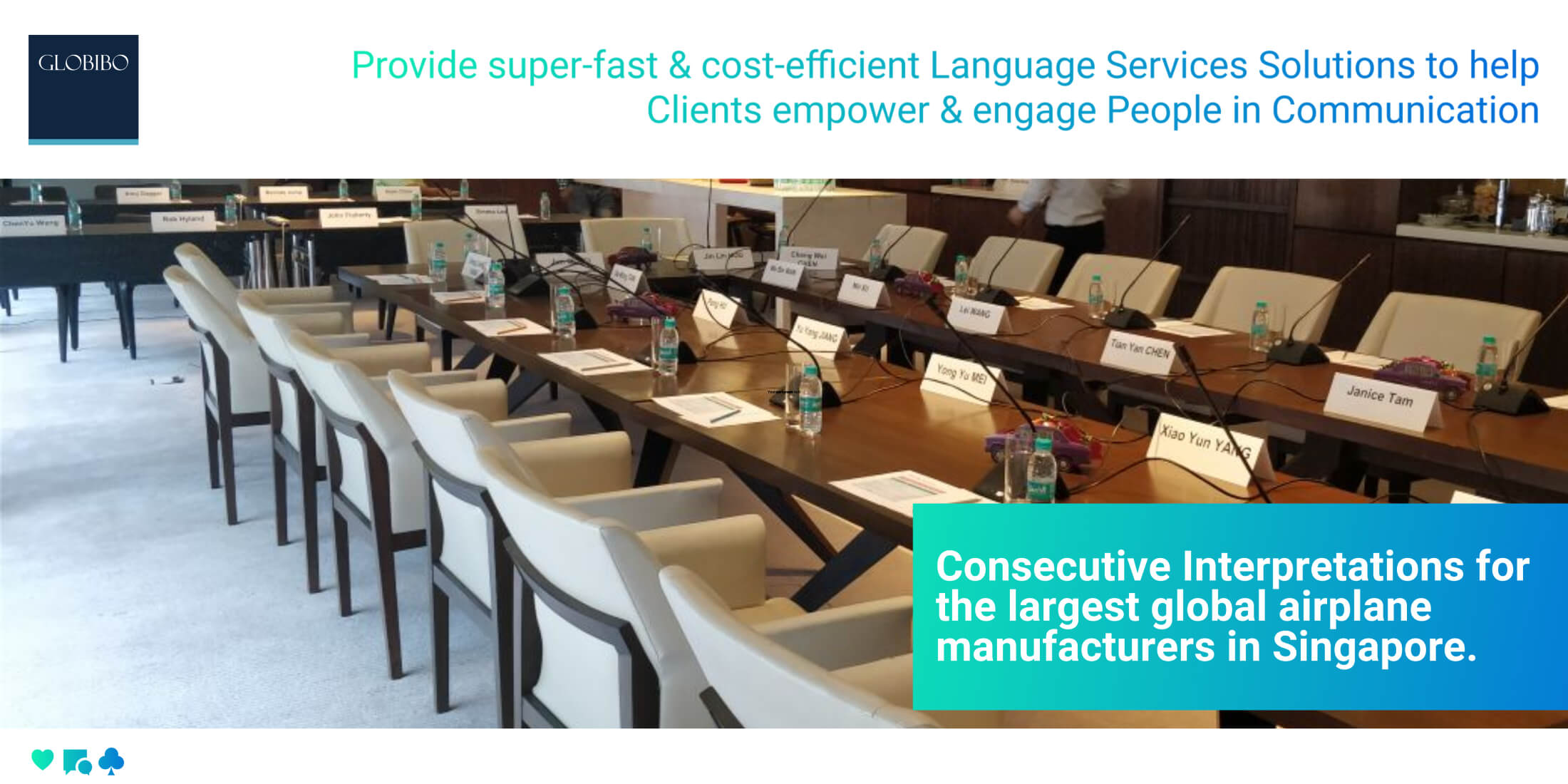
15 Jan 2024
Globibo provided onsite consecutive interpretation for a known Medicine Practitioners Board.

17 NOV 2023
Globibo successfully facilitated 3 days of Consecutive Interpretation for a leading management consulting company in Indonesia.
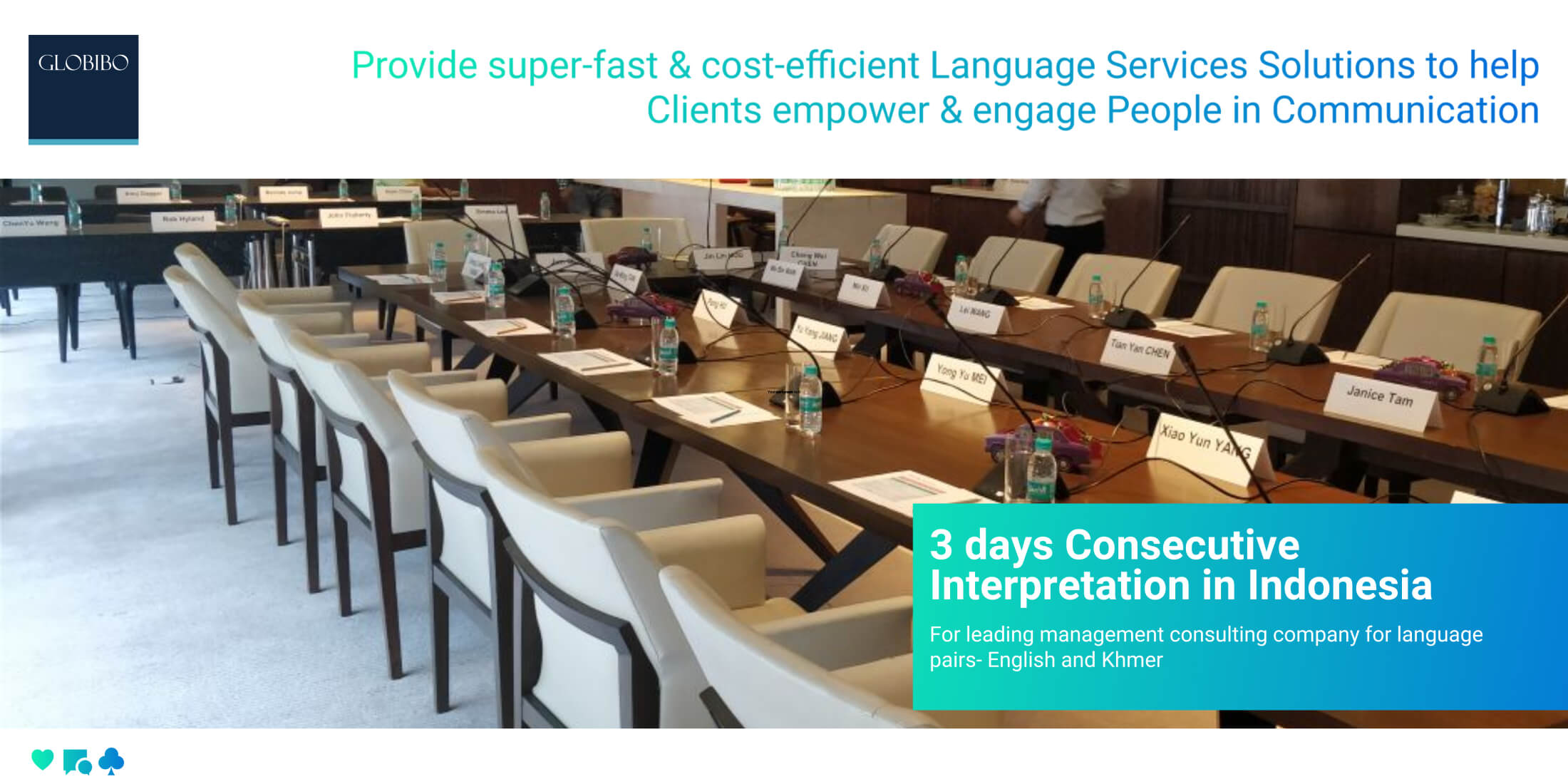
28 Oct 2023
Globibo successfully facilitated onsite solo consecutive interpretation for a leading motoring association in Singapore
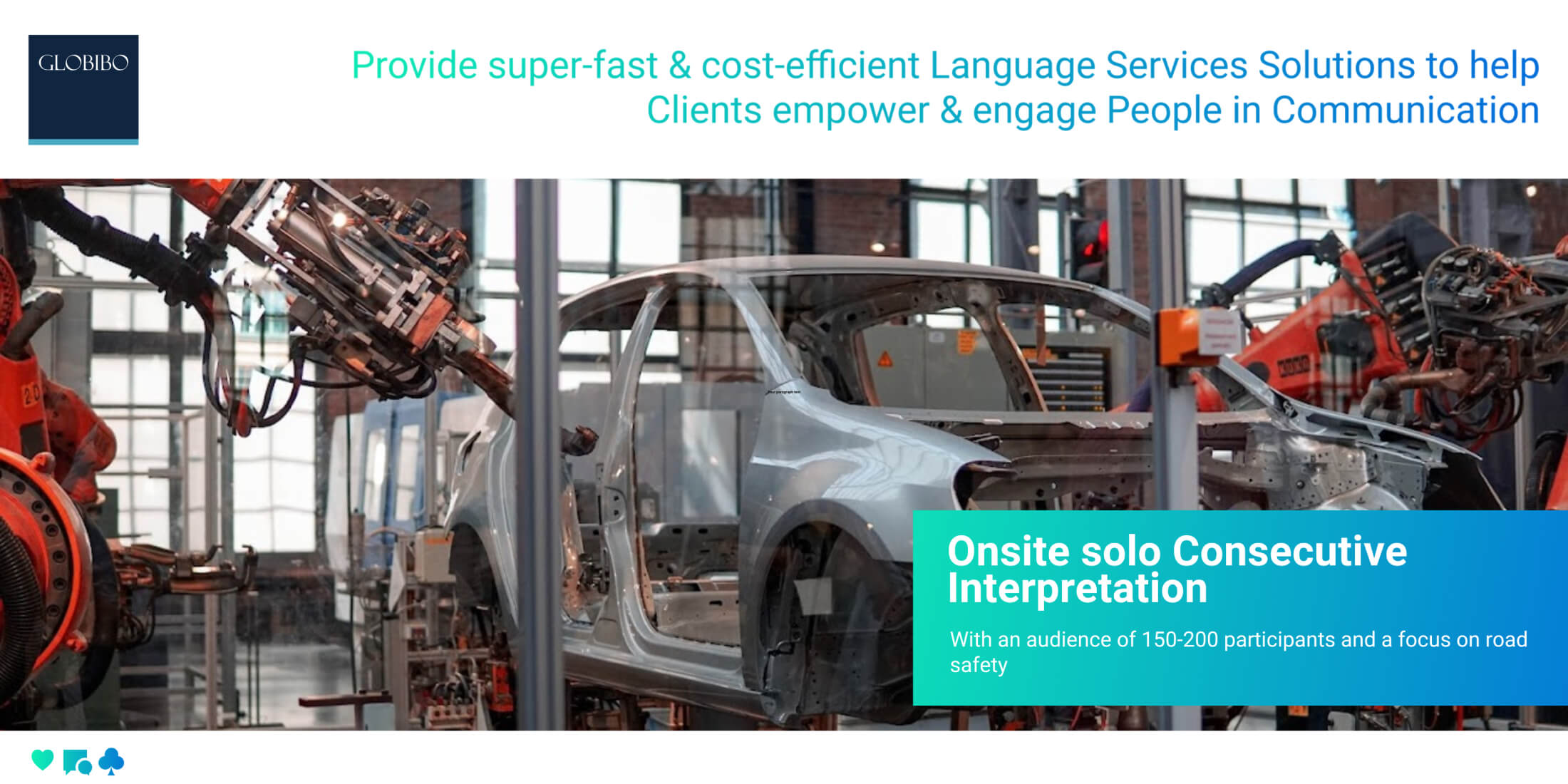
1 Dec 2023
Globibo provided Aviation Consecutive Interpretation at Subang Airport & JWN.
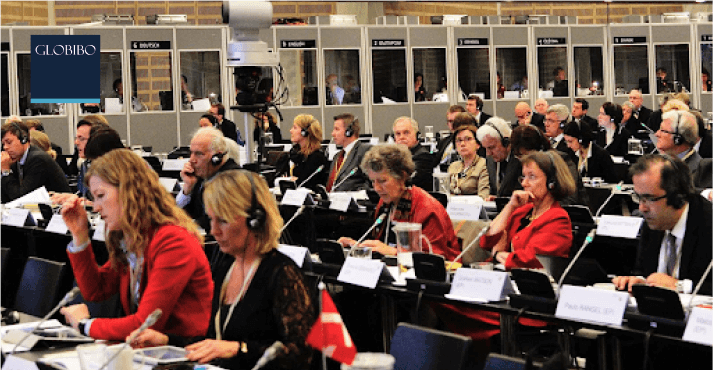
30 Oct 2023
Globibo is providing consecutive and simultaneous interpretation services
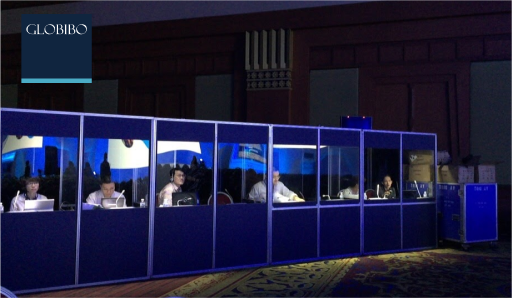
3 July 2023
Globibo's German to English Consecutive Interpretation

14 July 2023
Government projects with Onsite Consecutive Interpreting
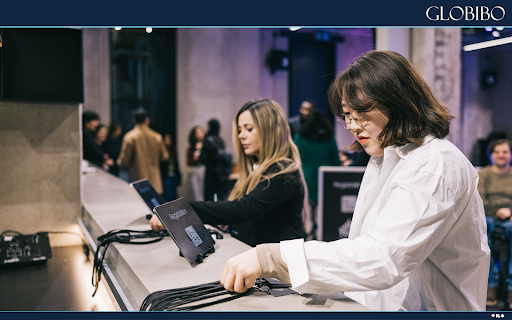
13 May 2023
Globibo's Onsite Consecutive Interpretation Services

20 May 2023
Globibo successfully hosted a government project event with consecutive interpretation.
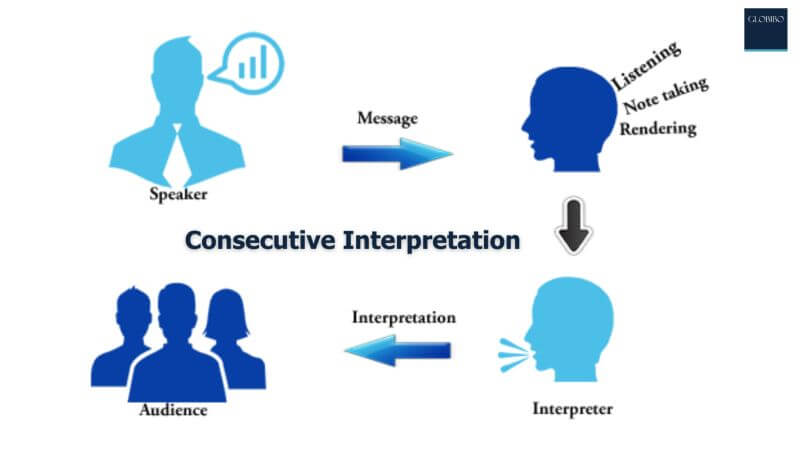
Nov 2022
Liaison and Consecutive Interpretation for Italian Clients.

Aug 2022
Consecutive Interpretation for delegation of Vienna for World City Summit.

July 2022
Braehler Interpreter Consoles in use at Tsao Foundation Workshop
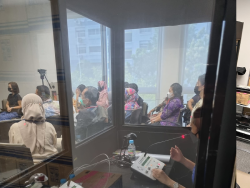
Consecutive Language Interpretation FAQ
1. How do you choose language interpreters for consecutive interpretation?
For a language interpreter to be a part of our consecutive interpretation team, the first thing they need is standard qualification and certification. Further, we have set a qualification standard of our own to ensure we hire only the best linguists. You can talk to our experts to learn how we pick our language interpreters.
2. Do you have reliable consecutive interpretation systems?
When you choose our consecutive interpretation service, you get a decent range of consecutive interpretation system that helps to adapt to the client’s every need. We have all the key components required for consecutive interpretation.
3. Why Should I go for consecutive interpretation?
Consecutive interpretation is a basic interpretation type that can help you easily communicate with an audience that speaks a different language. This interpretation type is more reliable since they have enough time to prepare notes and reevaluate the information.
4. How is Consecutive Interpretation done?
An interpreter will take notes while the speaker talks, and when the speaker completes the sentence or part of speech, s/he will render the translation. The interpreter listens to the text, analyze it, jot the important points into the notes and then interpret it to the audience
5. When do you use Consecutive Interpretation?
Consecutive interpretation is suitable for smaller, more personal discussions like
- Personal Guidance during exhibitions
- Personal Interviews
- Small / Short negotiations
- Informal Business meets
6. What equipment is required for Consecutive Language Interpretation?
For Consecutive Interpretation simple or entirely no equipment is required. The need of equipment is determined by the number of participants / listeners of the interpretation
- Interpretation Transmitters
- Interpretation Receiver
- Interpretation Receiver Charging Cases :
7. Why is consecutive interpretation necessary?
In corporate meetings, consecutive interpretation is essential as it provides the gist of the meeting to all participants of the gathering. Language ceases to be a barrier with consecutive interpretation.
8. Is consecutive interpretation possible in real-time?
The consecutive interpreter is present during the meeting and provides the translation of the discussion in a forum in real-time. Therefore, it is not a delayed interpretation.
9. Other than translation, does a consecutive interpreter require any other skill?
A consecutive interpreter needs to take extensive notes of the meeting to provide a detailed translation of all the discussions held in the conference.
10. Does Globibo provide equipment for consecutive translation?
Yes, at Globibo, you will get all the necessary equipment such as Interpretation Transmitters, Interpretation Receiver, and Interpretation Receiver Charging Cases on rent. All of these will be provided when you hire our services for consecutive interpretation.
Quick Contact
Australia: +61 28317 3495
China: +86 21 8024 6090
France: +33 6 1302 2599
Germany: +49 (030) 8093 5151
Hong Kong: +852 5801 9962
India: +91 (11) 7127 9949
Malaysia: +603 9212 4206
Philippines: +63 28548 8254
Singapore: +65 6336 9002
Spain: +34 675 225 364
Vietnam: +84 985 611 322
UK: +44 (20) 3468 1833
US: +1 (718) 713 8593
Certification

ISO 27001 - Information Security Management System - Certificate #: CCL/ISMS/70818/GIPL

ISO 9001 - Quality Management System - Certificate #: CCL/QMS/70818/GIPL

ISO 17100 - Quality Translation Services Management System - Certificate #: CCL/QMS/70821/GIPL
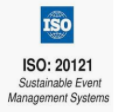
ISO 20121 - Event Sustainability Management System - Certificate #: CCL/QMS/70822/GIP
Testimonials


Globibo News

Globibo Panda Run
Join 28th of March, in Singapore 8.15pm Marina Bay Sands...

Globibo Hong Kong
A new milestone was hit in September 2012 with our own office in Hong Kong.

Corporate Training Website
Our Our Globibo Corporate Training Website is finally online.

Happy New Year
Happy New Year 2013. May it bless all of us with loads of joy & success.

Language-school.sg
Our new Web site dedicated to Language Courses in Singapore goes...





